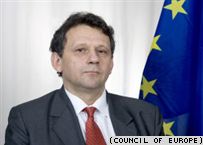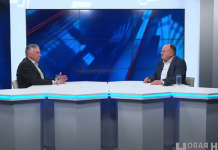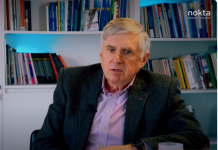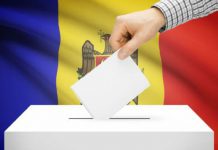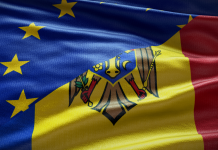Infotag: Mr. Mizsei, you have been the EU Special Representative to Moldova since March 2007. So, what could you say about the settlement of the conflict with Moldova’s breakaway Transnistrian region – a key problem for Moldova’s authorities?
Kalman Mizsei: This is a very complicated process since there are interests for and against settlement and in this region, and among many of the participants the culture of striking win-win compromises is not deeply rooted. But I would say that the Moldovan government that was formed last autumn has really tried to open a new chapter by intensifying its efforts for building confidence with the Transnistrian authorities. It is desirable that in the coalition there emerges enough discipline that everybody speaks in the same spirit of confidence building. Also, the Transnistrian authorities, for the sake of the people there, should put more faith in building bridges with Chisinau and also use them. I hope though that some new initiatives that are emerging will help to accelerate the process.
Infotag: Are there any chances of solving the Transnistrian conflict in the near future? No top level meetings have been held for more than three years.
Kalman Mizsei: Yes, there are chances. The better the cooperation between the EU, Russia and Ukraine, the better are the chances for a dialogue that can lead to the settlement. The interests of Chisinau and Tiraspol are also very important in this process și the more the participants of the 5+2 process talk to each other, the more they can realize common interests și on the basis of which we could start the negotiation process.
Infotag: How do you assess the recent joint statement by Russian and Ukrainian presidents, the agreement reached by Angela Merkel and Dmitriy Medvedev, as well as Russian Foreign Minister Sergey Lavrov’s statement about EU’s possible participation in the peacekeeping operation in Transnistria and the possibility of resuming the 5+2 process talk?
Kalman Mizsei: I see many promising elements in each of this. There is a convergence of views, we all see the importance of the 5+2 settlement process, we all see the importance of confidence building between Chisinau and Tiraspol, we all see that the outside partners need to contribute to it and we all see the importance of human rights and the civil society in this process. And we all see that only very large scale and guaranteed status for Transnistria can open the way for a feasible settlement.
Infotag: Some politicians and analysts say that the 5+2 format is inefficient and unable to help reach consensus. Is there an alternative to this format?
Kalman Mizsei: It is not the 5+2 format that is responsible for the stalled negotiations but political factors within the participating countries and in their attitudes to each other. I think we all have learnt from the last 4 years and when we restart the negotiations those lessons will be taken into account. The participants of the 5+2 are the right participants și the only thing is that it would not be productive if someone wanted to create first category and second category participants there along the line of guarantors and observers. The EU is Moldovas most significant neighbour and thus is naturally expecting to be an equal partner to others there. Our economic significance also grows in Transnistria and I think in Tiraspol they also understand that we do not come there with any bad intention but to help to create a situation that is win-win for everyone.
Infotag: Is the Transnistrian conflict a great obstacle on Moldova’s path to European integration? Could Moldova join the EU following Cyprus’s example?
Kalman Mizsei: I would say that the solution of the Transnistrian conflict and the European integration are intimately interlinked. First, the more the rule-of-law prevails in right bank Moldova, the more the Transnistrians can be confident that in the common state they will not be discriminated against. Second, more economic reform in Moldova means more prosperity that is also good for the Transnistrians. Third, the more the kind of democratic tolerance Chisinau displays in its internal political and social life the more again reinforcing it will be for Transnistria. These are all also conditions for an accelerated integration in the European Union. As to the Cyprus question, that experience if anything makes member states even more aware that they would like to see the solution of the Transnistrian conflict as soon as possible. But it will take time and I trust the Transnistrian settlement will happen sooner.
Infotag: How efficient is the travel ban imposed by the EU against Transnistria’s leaders?
Kalman Mizsei: Well, I should start by saying that when the travel limitations were introduced I was not yet EU Special Representative. Since I have taken on this mission I have been working to find ways to build confidence, including by creating an environment allowing for easing these restrictions. I hope that the Transnistrian leadership will do its utmost to add their part. We are particularly eager to see 3 things: the renewal of the negotiating process, free movement of people, including Moldovan officials and an acceptable solution to those Latin script schools in the left bank. It would tremendously improve the climate that can help in many ways. Good negotiations can happen if trust builds between the partners. Travel restrictions do not belong to devices to build trust. They build isolation and it is not good. So, we all need to work together to make those elements of policy belonging to the past. We need engagement, not isolation.
Infotag: Is it possible to achieve a settlement of the Transnistrian conflict with the current leaders of the breakaway region?
Kalman Mizsei: We need to work with people who are in charge. I have met all the Transnistrian leaders and I can say that none of them are such that I would say it is impossible to work with. But it needs to be a partnership and needs to be a sustained attitude to build confidence, otherwise it is difficult to bring out some from their bunkers. They need convincing it is not a war against them but a cooperative situation from which they can benefit. They were treated too long as enemies more than partners. But they also need to do more și to answer positive gestures. They sometimes thin that as outcasts they can do whatever they want. Well, they should not be outcasts and on the other hand they need to start behaving responsibly. Again, it is important to this that they feel we treat them as actors in the game.
Infotag: Could the Transnistrian conflict be solved without Russia and Ukraine?
Kalman Mizsei: Of course not. These two countries are indispensable to the solution. And your question is good insofar some people treat them as nuisance. The European Union has approached Russia and Ukraine always with respect that partners deserve. Again, the coin has two sides și partnership needs responsible behaviour that aims towards a serious, focused effort to solve this problem.
Infotag: What is Brussels’, EU’s and USA’s attitude towards statements by the Transnistrian leaders who say that the local people would like the region to join Russia?
Kalman Mizsei: First of all it is a long way in Transnistria from a situation when a population would get unbiased information for a sustained period of time and then expresses its free will. Second, there is such thing as international law that clearly says Transnistria belongs to Moldova since it was part of the Moldovan Soviet Socialist Republic in the time of the collapse of the Soviet Union. The Dniester should unite, not divide. But again, there is also a responsibility on the other side. The Russian and Ukrainian speaking population of the region needs to feel that they can freely use their mother tongue. Moldovas policy in this respect is good. What needs to improve is rhetoric of some politicians. The Russian language has an important role to play on both banks of the Dniester. Again, the other side of the equation is that the Transnistrian language and cultural policy needs to give the rights to the mother tongue of the ethnic Moldovans that they claim they give. In practice there is a Soviet style russification there that needs to be changed. In that respect a good opportunity is to show progress with the latin script schools until the start of the new school year.
Infotag: Can Russia be considered a participant in the settlement process equal to Ukraine and OSCE or is it playing a more important role?
Kalman Mizsei: Every partner has its specific role and of course Russia is a key partner in this situation as well as in many other ways in building a common, free continent. I remain convinced that the Transnistrian settlement will be one of the building elements of this new, cooperative and free Europe that actually stretches to Vladivostok. We, the people of the European Union, have much common with the Russian people and we need projects that make both sides feel that way. The Transnistrian conflict begs for such a joint effort that brings us together and makes us on both sides feel that we have done a good job for the people living here, we have created conditions of prosperity here. This will then give us on both sides confidence to solve more ambitious common goals towards a united, common, democratic, humanistic Europe.
Infotag: What is your forecast for the Transnistrian settlement process?
Kalman Mizsei: You know, if all want we can have already tangible results in 1 year. In 5 years și sure we will have them. This situation on the Dniestr or Nistru is increasingly anachronistic and we need a humanistic solution to it și now.
Infotag: How are you evaluating the domestic situation of Moldova?
Kalman Mizsei: The country has done much since the last parliamentary elections. Its economic policy is prudent even if more attention should be paid to those structural reforms that make its regulatory system compatible with Europe and also more attention needs to be paid to systemic guarantees for reducing corruption. Also, its European integration policy got a new, visible impetus with a very competent management from the Prime Minister and his Ministry of Foreign Affairs and European Integration. Plurality of the media had also increased. A coalition, however, that carries the name European integration, needs to be very prudent about democratic standards and the rule-of-law. I regret to see what has happened și or better to say what has NOT happened și with the parliamentary discussion on the way the President is elected. The Moldovan political elite has missed yet another chance to look European here, I must say. Democracy means negotiations and wise compromises. There was no serious effort made to find a compromise solution. Also, the rhetoric is still sometimes antagonistic and such that questions opponents democratic credentials. Democracy can not be without opposition and their rights need also to be respected, and they need to be treated as partners rather than enemies. On the other hand, the opposition also has responsibilities, not only rights: their rhetoric must also respect this. The reason I mention this at length is that all what the Moldovan government does to reform can only be sustained if tolerant behaviour on both sides takes root. It is critical for democracy and democracy is critical to Moldovas European integration. This one last step the Moldovan political elite on both sides must make so that we can treat democracy here irreversible. Also, the practice that before each election the governing party or coalition rewrites the election rules needs to change. Election rules should be formulated long enough before the elections so that people do not suspect it is designed to accommodate the incumbent. But overall Moldova has a lot to build on, it is the clearest candidate for European integration East of the EU and its negotiations for association progress with record speed thanks to the preparedness of the negotiators, a clear governmental mandate they got and their manners that are truly European. This is very important.


